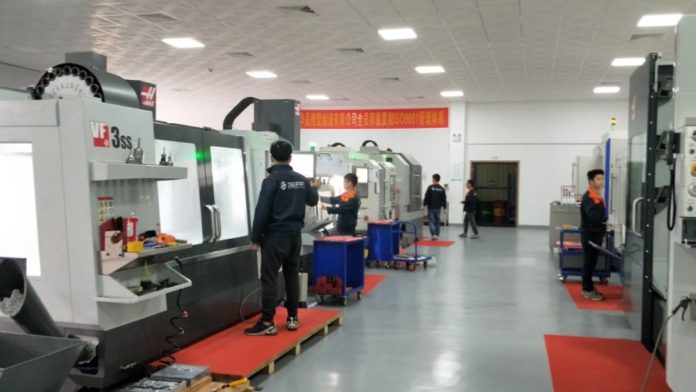A machine shop is where subtractive manufacturing processes like machining are carried out. It’s a space or building with machinery where machinists and other technical workers produce items, not a “shop” like a store. The shop may be housed in a room within a small firm or as part of a larger factory.
The “machines” in question are pieces of machinery that have cutting tools. Any operation involving the removal of material from a block of metal, plastic, or other raw material can be performed using these machines: drilling, cutting, shaping, milling, etc. Subtractive manufacturing is the primary focus, while machine shops may also provide other technologies, such as 3D printing.
Businesses that run machine shops might be producers of a particular brand of goods or independent producers (such as 3ERP) who provide online bespoke CNC machining services to a variety of clients in many industries. A machine shop could have raw material storage areas in addition to machinery that can be used to produce items. That being said, materials might be kept somewhere else, contingent on the manufacturer’s size.
Machine Shop Safety Tips
Machine shops are a hive of activity where complex parts and components are expertly made. Maintaining worker safety amid the whirlwind of machinery is critical. Strict safety regulations are implemented to safeguard workers’ health and safety, as well as to increase productivity and foster a healthy work environment. This article covers a wide range of safety advice for machine shops.
Personal Protective Equipment
The correct use of personal protective equipment is the cornerstone of machine shop safety. This includes earmuffs or earplugs to lessen noise exposure, gloves to protect hands from hot surfaces and sharp edges, and sturdy shoes with non-slip soles to avoid mishaps. To create an effective barrier between the worker and potential risks, personal protection equipment (PPE) needs to be worn consistently, maintained, and inspected regularly.
Machine Specific-Training
Workers should receive thorough training tailored to the equipment they will be utilizing before operating any apparatus. Machine setup, safe operation, emergency shutdown protocols, and appropriate maintenance techniques should all be covered in training programs. Frequent refresher training helps personnel stay up to date on machine technology and strengthen existing expertise.
Machine Guards and Safety Devices
Safety equipment and machine guards are necessary precautions in any machine shop. Guards ought to be installed to keep people away from machinery’s moving parts and hazardous locations. To guarantee prompt shutdown in the event of an emergency, interlocks and emergency stops must be operating properly. Maintaining the integrity and functionality of safety devices such as guards requires routine maintenance and inspections.
Safe Operating Procedure
Machine shop safety is fundamentally dependent on the establishment of clear and standardized operating procedures. Employees should be knowledgeable about material handling procedures, appropriate tool changes, and startup and shutdown sequences. Guidelines for handling hazardous materials and properly disposing of waste should be part of safe operating procedures.
Machine Maintenance
Not only is routine machine maintenance necessary for maximum efficiency, but it also ensures safety. Regular inspections of machinery are necessary to spot and fix wear and tear, loose parts, and other safety risks. Keeping your workspace tidy and orderly also lessens the chance of trips, falls, and slides. An environment that is secure and free of clutter is enhanced by following the right trash disposal techniques and using absorbents for spills.
Fire Safety
Fire safety is of utmost importance in machine shops since they frequently handle combustible materials, lubricants, and solvents. Employees should receive training on how to properly use fire extinguishers, which should be positioned in strategic locations and made easily accessible. Establishing evacuation routes and conducting regular fire drills are essential to ensuring that employees are ready to act quickly and efficiently in the event of a fire.
Emergency Protocols
Machine shops must establish well-defined emergency protocols that cover medical emergencies, equipment faults, fires, and natural disasters. Frequent training sessions and drills make sure that everyone is aware of their obligations and tasks in an emergency, which encourages a prompt and well-coordinated response.
Regular Safety Audits
Safety audits play a crucial role in spotting possible risks, assessing how well safety procedures are working, and putting improvements into place. Trained safety inspectors can identify problem areas through routine inspections, which can result in preventative actions to raise safety standards. Employee input should be valued to address safety problems collaboratively and transparently.
Final Words
Machine shop safety is a dedication to preserving lives and fostering an environment of accountability and responsibility, not just a collection of regulations. Machine shop safety is the cornerstone upon which successful businesses are built in the dynamic world of manufacturing, where efficiency and precision are vital. It guarantees a safe and prosperous future for businesses as well as for workers.










